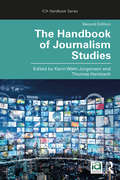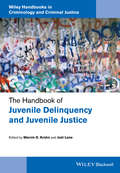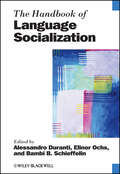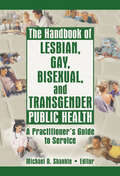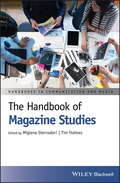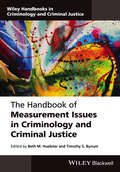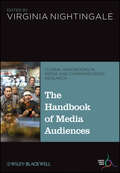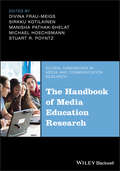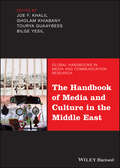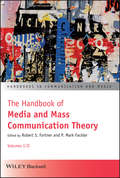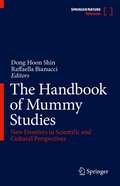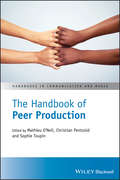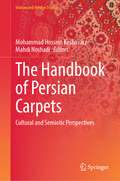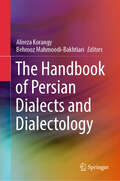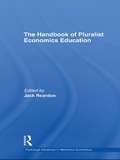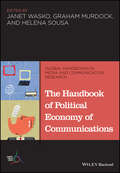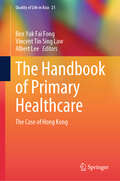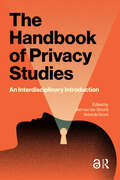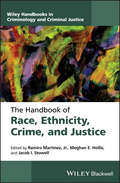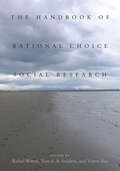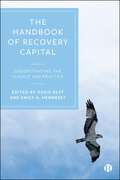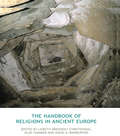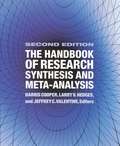- Table View
- List View
The Handbook of Journalism Studies (ICA Handbook Series)
by Karin Wahl-Jorgensen Thomas HanitzschThis second edition of The Handbook of Journalism Studies explores the current state of research in journalism studies and sets an agenda for future development of the field in an international context. The volume is structured around theoretical and empirical approaches to journalism research and covers scholarship on news production; news content; journalism and society; journalism and culture; and journalism studies in a global context. As journalism studies has become richer and more diverse as a field of study, the second edition reflects both the growing diversity of the field, and the ways in which journalism itself has undergone rapid change in recent years. Emphasizing comparative and global perspectives, this new edition explores: Key elements, thinkers, and texts Historical context Current state of the field Methodological issues Merits and advantages of the approach/area of study Limitations and critical issues of the approach/area of study Directions for future research Offering broad international coverage from world-leading contributors, this volume is a comprehensive resource for theory and scholarship in journalism studies. As such, it is a must-have resource for scholars and graduate students working in journalism, media studies, and communication around the globe.
The Handbook of Juvenile Delinquency and Juvenile Justice (Wiley Handbooks in Criminology and Criminal Justice #1)
by Marvin D. Krohn Jodi LaneThis handbook is an up-to-date examination of advances in the fields of juvenile delinquency and juvenile justice that includes interdisciplinary perspectives from leading scholars and practitioners. Examines advances in the fields of juvenile delinquency and juvenile justice with interdisciplinary perspectives from leading scholars and practitioners Provides a current state of both fields, while also assessing where they have been and defining where they should go in years to come Addresses developments in theory, research, and policy, as well as cultural changes and legal shifts Contains summaries of juvenile justice trends from around the world, including the US, the Netherlands, Brazil, Russia, India, South Africa, and China Covers central issues in the scholarly literature, such as social learning theories, opportunity theories, criminal processing, labeling and deterrence, gangs and crime, community-based sanctions and reentry, victimization, and fear of crime
The Handbook of LGBTQIA-Inclusive Hospice and Palliative Care
by Kimberly D. AcquavivaHospice and palliative care professionals are experts at caring for individuals and families experiencing serious or life-limiting illnesses. Not everyone feels safe seeking out their expertise, however: LGBTQIA+ people may be deterred from seeking support because of barriers—both overt and subtle—that hospice and palliative care programs and professionals erect through their policies and practices. This book is an accessible, expert guide to incorporating LGBTQIA-inclusive practices into end-of-life care. It equips both new and experienced hospice and palliative care professionals with the knowledge they need to ensure that all people receive high-quality care.Kimberly D. Acquaviva surveys fundamental concepts and the latest clinical developments, integrating relatable anecdotes and poignant personal reflections. She discusses her own experience caring for her wife, Kathy, who was diagnosed with ovarian cancer in 2019. Unable to find a local hospice with an LGBTQIA-inclusive nondiscrimination statement, let alone one whose staff had been trained to provide nondiscriminatory care to LGBTQIA+ people, Kathy died at home six months later without hospice care.Acquaviva offers clear, actionable strategies for palliative care and hospice physicians, physician associates, advanced-practice registered nurses, registered nurses, social workers, counselors, chaplains, and others. She also emphasizes how incorporating LGBTQIA-inclusive practices can transform work with every person receiving care. Anchored in the evidence and written in plain language, this book is the definitive guide for hospice and palliative care professionals seeking to deliver exceptional care to all the patients and families they serve.
The Handbook of Language Socialization
by Elinor Ochs Bambi B. Schieffelin Alessandro DurantiDocumenting how in the course of acquiring language children become speakers and members of communities, The Handbook of Language Socialization is a unique reference work for an emerging and fast-moving field.Spans the fields of anthropology, education, applied linguistics, and human development Includes the latest developments in second and heritage language socialization, and literary and media socialization Discusses socialization across the entire life span and across institutional settings, including families, schools, work places, and churches Explores data from a multitude of cultures from around the world
The Handbook of Lesbian, Gay, Bisexual, and Transgender Public Health: A Practitioner's Guide to Service
by Michael ShankleGet the comprehensive resource for LGBT public health issues!Public health services for sexual minorities have suffered from practitioners&’ lack of knowledge about sexual or gender orientation, specific health concerns, and inherent system homophobia and heterosexism. The Handbook of Lesbian, Gay, Bisexual, and Transgender Public Health: A Practitioner&’s Guide to Service provides a unique focus on LGBT public health, offering positive direction for practitioners looking for guidance in methods to ensure a healthy community for all while taking into consideration the special needs of sexual minorities. Ignorance and fear by both practitioners and LGBT clients leads to less-than-optimum public health services. The Handbook of Lesbian, Gay, Bisexual, and Transgender Public Health extensively discusses these issues clearly, working to foster cultural competency among public health professionals. This book lays the groundwork for better understanding of LGBT health issues and their relationship to overall public health, then delves into the research on how incorporating LGBT cultural competency can improve academic institutions and continuing education programs. The problem of providing health care access and the health issues burdening each segment of the LGBT community are discussed in detail, all with a focus on providing effective solutions to tough challenges. Clear strategies are also presented for improving city, county, state, and national public health infrastructures and policies. The issue of productive and safe work environments in business and the private sector for LGBT individuals is addressed, along with a close look at the advantages-and pitfalls-of media and Internet resources. Many chapters are illustrated with tables and diagrams; each chapter is exhaustively referenced, includes useful lists of selected resources, and asks questions to spark thought on the issues as they pertain to the reader's circumstances. The Handbook of Lesbian, Gay, Bisexual, and Transgender Public Health discusses: the inequities in health care for LGBT people overt prejudice, discrimination, disdain, or outright denial of services assumption by health professionals of risk factors based on sexual or gender orientation rather than individual behaviors and health history unwitting expression of biases of many public health practitioners the effect of social stigma on public health care services LGBT cultural competency framework for institutions of higher learning and professional organizations LGBT awareness, sensitivity, and competency training sexually transmitted diseases reproductive cancers intimate partner violence noncommunicable diseases among gay and bisexual men &’down low&’ behavior (avowed straight men with spouses having sex with other men) as public health issue AIDS-related malignancies transsexuals and transphobia hormonal therapy sex reassignment surgery (SRS) mental health needs of transsexuals, cross-dressers, and intersex individuals barriers to health care access insurance systems confidentiality of medical records substance use health care issues for LGBT youth and young adults health care needs of LGBT elders recommendations for improvement of health and welfare servicesThe Handbook of Lesbian, Gay, Bisexual, and Transgender Public Health is a one-of-a-kind resource for LGBT public health issues, essential for public health professionals, practitioners, health services professionals, substance abuse counselors, disease intervention specialists, public health advisors, community health service administrators, community based agencies, and community health nurses. Educators in community hea
The Handbook of Magazine Studies (Handbooks in Communication and Media)
by Tim Holmes Miglena SternadoriA scholarly work examining the continuing evolution of the magazine—part of the popular Handbooks in Media and Communication series The Handbook of Magazine Studies is a wide-ranging study of the ways in which the political economy of magazines has dramatically shifted in recent years—and continues to do so at a rapid pace. Essays from emerging and established scholars explore the cultural function of magazine media in light of significant changes in content delivery, format, and audience. This volume integrates academic examination with pragmatic discussion to explore contemporary organizational practices, content, and cultural impact. Offering original research and fresh insights, thirty-six chapters provide a truly global perspective on the conceptual and historical foundations of magazines, their organizational cultures and narrative strategies, and their influences on society, identities, and lifestyle. The text addresses topics such as the role of advocacy in shaping and changing magazine identities, magazines and advertising in the digital age, gender and sexuality in magazines, and global magazine markets. Useful to scholars and educators alike, this book: Discusses media theory, academic research, and real-world organizational dynamics Presents essays from both emerging and established scholars in disciplines such as art, geography, and women’s studies Features in-depth case studies of magazines in international, national, and regional contexts Explores issues surrounding race, ethnicity, activism, and resistance Whether used as a reference, a supplementary text, or as a catalyst to spark new research, The Handbook of Magazine Studies is a valuable resource for students, educators, and scholars in fields of mass media, communication, and journalism.
The Handbook of Marriage in the Arab World (Gulf Studies #17)
by Md Mizanur Rahman Ahmed ArefThis open access handbook combines multiple theoretical and practical approaches for enabling a nuanced understanding of the phenomenon of marriage in the Arab world. Adopting a holistic, interdisciplinary approach, it provides a framework for the contextual and macro factors surrounding and affecting marriage in the Arab countries. It looks at the different types of marriage, whether traditional or new to the Arab world, and takes a detailed examination of the dialectic of marriage and age. It considers the dynamics surrounding delayed marriages, early marriages, celibacy, marriage costs, and age gaps between spouses. In addition, it examines marital relations vis-à-vis a diverse array of sub-topics, including marital and emotional satisfaction, and violence. It also looks at the relationship between work and marriage, and explores how ‘women’s work’ affects their family relationships and intimacy. Finally, it offers a rich analysis of two core marriage-related issues in the modern Arab world: migration and its positive/negative impacts on the institution of marriage, and marriage in the context of war and conflict, as present in several areas within the Arab region. A sociological magnum opus for social science students and researchers in areas of marriage studies, gender studies, family studies, the sociology of work, peace and conflict studies, human migration, and economics, it is also relevant to policymakers, politicians, social workers, and human rights and migration activists working in the Arab world and beyond.
The Handbook of Measurement Issues in Criminology and Criminal Justice (Wiley Handbooks in Criminology and Criminal Justice)
by Beth M. Huebner Timothy S. BynumThis volume of the series was designed to provide a comprehensive primer on the existing best practices and emerging developments in the study and design research on crime and criminology. The work as a whole includes chapters on the measurement of criminal typologies, the offenders, offending and victimization, criminal justice organizations, and specialized measurement techniques. Each chapter is written by experts in the field and they provide an excellent survey of the literature in the relevant area. More importantly, each chapter provides a description of the various methodological and substantive challenges presented in conducting research on these issues and denotes possible solutions to these dilemmas. An emphasis was placed on research that has been conducted outside of the United States and was designed to give the reader a broader more global understanding of the social context of research. The goal of this volume is to provide a definitive reference for professionals in the field, researchers, and students. This volume in the Handbooks in Criminology and Criminal Justice series identifies the principal topical areas of research in this field and summarizes the various methodological and substantive challenges presented in conducting research on these issues. In each chapter, authors provide a summary of the prominent data collection efforts in the topical area, provide an overview of the current methodological work, discuss the challenges in the measurement of central concepts in the subject area, and identify new horizons emerging in data collection and measurement. We encouraged authors to discuss work conducted in an international context and to incorporate discussion of qualitative methodologies when appropriate.
The Handbook of Media Audiences (Global Handbooks in Media and Communication Research #5)
by Virginia NightingaleThis handbook offers a comprehensive overview of the complexity and diversity of audience studies in the advent of digital media. Details the study of audiences and how it is changing in relation to digital media Recognizes and appreciates valuable traditional approaches and identifies how they can be applied to, and evolve with, the changing media world Offers diverse perspectives from which being an audience, theorizing audiences, researching audiences, and doing audience research are approached today Argues that the field works best by identifying particular 'audience problems' and applying the best theories and research methods available to solving them Includes contributions from some of the most outstanding international scholars in the field
The Handbook of Media Education Research (Global Handbooks in Media and Communication Research)
by Michael Hoechsmann Stuart R. Poyntz Divina Frau-Meigs Manisha Pathak-Shelat Sirkku KotilainenA guide to the most recent practices and theories of media education research Over the past forty years, media education research has emerged as a historical, epistemological and practical field of study. Action shifts in the field—along with radical transformation in media technologies, aesthetic forms, ownership models, and audience participation practices—have driven the application of new concepts and theories across a range of both school and non-school settings. The Handbook on Media Education Research is a unique exploration of this complex set of practices, theories, and tools of media research. Featuring contributions from a diverse range of internationally-recognized experts and practitioners, this timely volume discusses the most recent developments in the field in the context of related scholarship, public policy, formal and non-formal teaching and learning, and DIY and community practice. Offering a truly global perspective, the Handbook focuses on empirical work from Media and Information Literacy (MIL) practitioners from around the world. The book’s five parts explore global youth cultures and the media, trans-media learning, media literacy and scientific controversies, varying national approaches to media research, media education policies, and much more. A groundbreaking resource on the concepts and theories of media research, this important book: · Provides a diversity of views and experiences relevant to media literacy education research · Features contributions from experts from a wide-range of countries including South Africa, Finland, India, Italy, Brazil, and many more · Examines the history and future of media education in various international contexts · Discusses the development and current state of media literacy education institutions and policies · Addresses important contemporary issues such as cyberbullying, data privacy, social movement media, and digital rights advocacy The Handbook on Media Education Research is an invaluable guide for researchers in the field, undergraduate and graduate students in media studies, policy makers, and MIL practitioners.
The Handbook of Media and Culture in the Middle East (Global Handbooks in Media and Communication Research)
by Bilge Yesil Tourya Guaaybess Joe F. Khalil Gholam KhiabanyThe Handbook of Media and Culture in the Middle East The Handbook of Media and Culture in the Middle East is an invaluable resource for anyone seeking to understand the profound and complex changes shaping the 21st century. With trans-regional contributions from established and emerging scholars, this ground-breaking volume offers conceptual essays and in-depth chapters that present rich analyses grounded in historical and geopolitical contexts, as well as key theory and empirical research. Rather than viewing the Middle East as a monolithic culture, this Handbook examines the diverse and multi-local characteristics of the region’s knowledge production, dynamic media, and rich cultures. It addresses a wide range of topics, including the evolving mainstream and alternative media, competing histories in the region, and pressing socio-economic and media debates. Additionally, the Handbook explores the impact of regional and international politics on Middle Eastern cultures and media. Designed to serve as a foundation for the next era of research in the field, The Handbook of Media and Culture in the Middle East is essential reading for all academics, scholars, and media practitioners. Its comprehensive scope makes it an excellent primary or supplementary textbook for undergraduate or graduate courses in global studies, media and communication, journalism, anthropology, sociology, economics, political science, and history.
The Handbook of Media and Mass Communication Theory
by Robert S. Fortner P. Mark FacklerThe Handbook of Media and Mass Communication Theory presents a comprehensive collection of original essays that focus on all aspects of current and classic theories and practices relating to media and mass communication.Focuses on all aspects of current and classic theories and practices relating to media and mass communicationIncludes essays from a variety of global contexts, from Asia and the Middle East to the AmericasGives niche theories new life in several essays that use them to illuminate their application in specific contextsFeatures coverage of a wide variety of theoretical perspectivesPays close attention to the use of theory in understanding new communication contexts, such as social media
The Handbook of Mummy Studies: New Frontiers in Scientific and Cultural Perspectives
by Dong Hoon Shin Raffaella BianucciOwing to their unique state of preservation, mummies provide us with significant historical and scientific knowledge of humankind’s past. This handbook, written by prominent international experts in mummy studies, offers readers a comprehensive guide to new understandings of the field’s most recent trends and developments. It provides invaluable information on the health states and pathologies of historic populations and civilizations, as well as their socio-cultural and religious characteristics. Addressing the developments in mummy studies that have taken place over the past two decades – which have been neglected for as long a time – the authors excavate the ground-breaking research that has transformed scientific and cultural knowledge of our ancient predecessors. The handbook investigates the many new biotechnological tools that are routinely applied in mummy studies, ranging from morphological inspection and endoscopy to minimally invasive radiological techniques that are used to assess states of preservation. It also looks at the paleoparasitological and pathological approaches that have been employed to reconstruct the lifestyles and pathologic conditions of ancient populations, and considers the techniques that have been applied to enhance biomedical knowledge, such as craniofacial reconstruction, chemical analysis, stable isotope analysis and ancient DNA analysis. This interdisciplinary handbook will appeal to academics in historical, anthropological, archaeological and biological sciences, and will serve as an indispensable companion to researchers and students interested in worldwide mummy studies.
The Handbook of Peer Production (Handbooks in Communication and Media)
by Christian Pentzold Sophie Toupin Mathieu O’NeilThe definitive reference work with comprehensive analysis and review of peer production Peer production is no longer the sole domain of small groups of technical or academic elites. The internet has enabled millions of people to collectively produce, revise, and distribute everything from computer operating systems and applications to encyclopedia articles and film and television databases. Today, peer production has branched out to include wireless networks, online currencies, biohacking, and peer-to-peer urbanism, amongst others. The Handbook of Peer Production outlines central concepts, examines current and emerging areas of application, and analyzes the forms and principles of cooperation that continue to impact multiple areas of production and sociality. Featuring contributions from an international team of experts in the field, this landmark work maps the origins and manifestations of peer production, discusses the factors and conditions that are enabling, advancing, and co-opting peer production, and considers its current impact and potential consequences for the social order. Detailed chapters address the governance, political economy, and cultures of peer production, user motivations, social rules and norms, the role of peer production in social change and activism, and much more. Filling a gap in available literature as the only extensive overview of peer production’s modes of generating informational goods and services, this groundbreaking volume: Offers accessible, up-to-date information to both specialists and non-specialists across academia, industry, journalism, and public advocacy Includes interviews with leading practitioners discussing the future of peer production Discusses the history, traditions, key debates, and pioneers of peer production Explores technologies for peer production, openness and licensing, peer learning, open design and manufacturing, and free and open-source software The Handbook of Peer Production is an indispensable resource for students, instructors, researchers, and professionals working in fields including communication studies, science and technology studies, sociology, and management studies, as well as those interested in the network information economy, the public domain, and new forms of organization and networking.
The Handbook of Persian Carpets: Cultural and Semiotic Perspectives (Iranian and Persian Studies)
by Mohammad Hossein Keshavarz Mahdi NoshadiThis book analyzes Persian carpets through the holistic and multifaceted perspective of cultural linguistics and semiotics, unveiling the deep connections between art, tradition, and collective memory. Persian carpets have been admired as masterpieces of intricate craftsmanship and profound cultural symbolism throughout history. This book takes this appreciation to an entirely new level by drawing on a new analytical framework and offering a platform for future studies in cultural conceptualizations and semiotics. By weaving together elements of history, culture, and artistic expression, this book presents an innovative perspective on Persian carpets, highlighting the deep and varied cultural heritage of Iran and its enduring influence on global art and civilization. Beyond academic circles, the book serves a wide and diverse readership—from students and researchers in visual arts, cultural linguistics, semiotics, anthropology, history, sociolinguistics, and Persian studies, to art enthusiasts and general readers captivated by the cultural richness of Persian carpets. Whether viewed as a scholarly resource or a fascinating journey into Iranian artistry, this book stands as a must-read for anyone drawn to the profound meaning woven into these magnificent artifacts.
The Handbook of Persian Dialects and Dialectology
by Alireza Korangy Behrooz Mahmoodi-BakhtiariThis innovative, investigative, and expansive handbook covers a multitude of angles through which the intricacies of Persian and its many dialects and accents can be examined and parsed with the view of understanding better the devices and paths through which language, and cultural cognizance, operate in tandem. As the first book in English to engage Persian dialects and dialectology on a broad and comprehensive scale, it develops an understanding of the paths through which maximization of the expressive power of words exists in Persian under the rubric of cultural conceptualizations. An insightful and all-encompassing resource for analyzing and augmenting knowledge of Persian linguistics, this work presents a thorough and all-encompassing interdisciplinary treatment of Persian. It is a vital resource for socio- and cultural linguists, as well as anthropologists and Iranists. It is also an excellent reference for historians researching Persian civilization, culture, literature and art.
The Handbook of Pluralist Economics Education (Routledge Advances in Heterodox Economics)
by Jack ReardonThis book provides a blueprint for those interested in teaching from a pluralist perspective, regardless of ideology. It provides educators, policy makers and students with helpful suggestions for implementing pluralism into pedagogy, by offering detailed suggestions and guidelines for incorporating pluralist approaches tailored to specific individual courses. The Handbook for Pluralist Economics Education specifically provides practical suggestions for professors willing to implement pluralism in the classroom and increases the pedagogical influence of pluralist economics while reducing the hegemony of monism at any level.
The Handbook of Political Economy of Communications (Global Handbooks In Media And Communication Research Ser. #8)
by Janet Wasko Helena Sousa Graham MurdockOver the last decade, political economy has grown rapidly as a specialist area of research and teaching within communications and media studies and is now established as a core element in university programmes around the world. The Handbook of Political Economy of Communications offers students and scholars a comprehensive, authoritative, up-to-date and accessible overview of key areas and debates. Combines overviews of core ideas with new case study materials and the best of contemporary theorization and research Written many of the best known authors in the field Includes an international line-up of contributors, drawn from the key markets of North and Latin America, Europe, Australasia, and the Far East
The Handbook of Primary Healthcare: The Case of Hong Kong (Quality of Life in Asia #21)
by Ben Yuk Fai Fong Vincent Tin Sing Law Albert LeeThis handbook adopts a transdisciplinary approach to primary healthcare, incorporating a wide scope of perspectives and case studies from Hong Kong in China. It consists of four sections that explore the foundations, practices, development aspects of primary healthcare and systems. The book also pays particular attention to the psychosocial and humanistic contexts of primary healthcare, exploring dimensions such as misinformation in the age of social media in health communication and aspects of resilience in primary healthcare. With contributions from scholars and practitioners in areas that include family medicine, psychology, nutrition, health policy, health education, dentistry, social work, as well as Chinese medicine, it is an expansive presentation of current knowledge on healthcare in the community setting. It is an indispensable reference for policymakers, researchers, advanced students, primary healthcare professionals, community health practitioners, and health managers and educators seeking to collate the practical and philosophical aspects of healthcare, in Hong Kong particularly, but also in Greater China and Asia more broadly. Beyond its relevance to the immediate medical community, it is also a valuable text for researchers in medical law, social sciences, quality of life studies, public policy, business administration, and information technology and health communication.
The Handbook of Privacy Studies: An Interdisciplinary Introduction
by Sloot, Bart van der Aviva De GrootThe Handbook of Privacy Studies is the first book in the world that brings together several disciplinary perspectives on privacy, such as the legal, ethical, medical, informatics and anthropological perspective. Privacy is in the news almost every day: mass surveillance by intelligence agencies, the use of social media data for commercial profit and political microtargeting, password hacks and identity theft, new data protection regimes, questionable reuse of medical data, and concerns about how algorithms shape the way we think and decide. This book offers interdisciplinary background information about these developments and explains how to understand and properly evaluate them.The book is set up for use in interdisciplinary educational programmes. Each chapter provides a structured analysis of the role of privacy within that discipline, its characteristics, themes and debates, as well as current challenges. Disciplinary approaches are presented in such a way that students and researchers from every scientific background can follow the argumentation and enrich their own understanding of privacy issues.
The Handbook of Race, Ethnicity, Crime, and Justice (Wiley Handbooks in Criminology and Criminal Justice)
by Ramiro Martínez Meghan E. Hollis Jacob I. StowellThis Handbook presents current and future studies on the changing dynamics of the role of immigrants and the impact of immigration, across the United States and industrialized and developing nations. It covers the changing dynamics of race, ethnicity, and immigration, and discusses how it all contributes to variations in crime, policing, and the overall justice system. Through acknowledging that some groups, especially people of color, are disproportionately influenced more than others in the case of criminal justice reactions, the “War on Drugs”, and hate crimes; this Handbook introduces the importance of studying race and crime so as to better understand it. It does so by recommending that researchers concentrate on ethnic diversity in a national and international context in order to broaden their demographic and expand their understanding of how to attain global change. Featuring contributions from top experts in the field, The Handbook of Race and Crime is presented in five sections—An Overview of Race, Ethnicity, Crime, and Justice; Theoretical Perspectives on Race and Crime; Race, Gender, and the Justice System; Gender and Crime; and Race, Gender and Comparative Criminology. Each section of the book addresses a key area of research, summarizes findings or shortcomings whenever possible, and provides new results relevant to race/crime and justice. Every contribution is written by a top expert in the field and based on the latest research. With a sharp focus on contemporary race, ethnicity, crime, and justice studies, The Handbook of Race and Crime is the ideal reference for advanced undergraduate students, graduate students, and scholars interested in the disciplines such as Criminology, Race and Ethnicity, Race and the Justice System, and the Sociology of Race.
The Handbook of Rational Choice Social Research
by Rafael Wittek Tom A. B. Snijders Victor NeeThe Handbook of Rational Choice Social Researchoffers the first comprehensive overview of how the rational choice paradigm can inform empirical research within the social sciences. This landmark collection highlights successful empirical applications across a broad array of disciplines, including sociology, political science, economics, history, and psychology. Taking on issues ranging from financial markets and terrorism to immigration, race relations, and emotions, and a huge variety of other phenomena, rational choice proves a useful tool for theory- driven social research. Each chapter uses a rational choice framework to elaborate on testable hypotheses and then apply this to empirical research, including experimental research, survey studies, ethnographies, and historical investigations. Useful to students and scholars across the social sciences, this handbook will reinvigorate discussions about the utility and versatility of the rational choice approach, its key assumptions, and tools.
The Handbook of Recovery Capital: Understanding the Science and Practice
by David Best, Emily A. Hennessy, William WhiteThis book brings together all the key evidence on recovery capital measurement and its application. It offers a clear and accessible overview of the development of the strengths-based approach in addressing behavioural health issues and quantifying and measuring recovery capital, along with the evidence base for this approach. The book sets out the proven benefits of this approach to measuring and bolstering addiction recovery, demonstrating the impact of the approach in improving the quality of services available to people at different stages of their recovery journey, making it the ‘go to’ book on this topic for researchers, policy makers, practitioners and people in recovery.
The Handbook of Religions in Ancient Europe (Acumen Handbooks Ser.)
by Olav Hammer Lisbeth Bredholt Christensen David Warburton"The Handbook of Religions in Ancient Europe" surveys the major religious currents of Europe before Christianity - the first continental religion with hegemonic ambition - wiped out most local religions. The evidence - whether archaeological or written - is notoriously difficult to interpret, and the variety of religions documented by the sources and the range of languages used are bewildering. The "Handbook" brings together leading authorities on pre-Christian religious history to provide a state-of-the-art survey. The first section of the book covers the Prehistoric period, from the Paleolithic to the Bronze Age. The second section covers the period since writing systems began. Ranging across the Mediterranean and Northern, Celtic and Slavic Europe, the essays assess the archaeological and textual evidence. Dispersed archaeological remains and biased outside sources constitute our main sources of information, so the complex task of interpreting these traces is explained for each case. The "Handbook" also aims to highlight the plurality of religion in ancient Europe: the many ways in which it is expressed, notably in discourse, action, organization, and material culture; how it is produced and maintained by different people with different interests; how communities always connect with or disassociate from adjunct communities and how their beliefs and rituals are shaped by these relationships. The "Handbook" will be invaluable to anyone interested in ancient History and also to scholars and students of Religion, Anthropology, Archaeology, and Classical Studies.
The Handbook of Research Synthesis and Meta-Analysis
by Larry V. Hedges Harris Cooper Jeffrey C. ValentinePraise for the first edition: “The Handbook is a comprehensive treatment of literature synthesis and provides practical advice for anyone deep in the throes of, just teetering on the brink of, or attempting to decipher a meta-analysis. Given the expanding application and importance of literature synthesis, understanding both its strengths and weaknesses is essential for its practitioners and consumers. This volume is a good beginning for those who wish to gain that understanding.” —Chance “Meta-analysis, as the statistical analysis of a large collection of results from individual studies is called, has now achieved a status of respectability in medicine. This respectability, when combined with the slight hint of mystique that sometimes surrounds meta-analysis, ensures that results of studies that use it are treated with the respect they deserve….The Handbook of Research Synthesis is one of the most important publications in this subject both as a definitive reference book and a practical manual.”—British Medical Journal When the first edition of The Handbook of Research Synthesis was published in 1994, it quickly became the definitive reference for researchers conducting meta-analyses of existing research in both the social and biological sciences. In this fully revised second edition, editors Harris Cooper, Larry Hedges, and Jeff Valentine present updated versions of the Handbook’s classic chapters, as well as entirely new sections reporting on the most recent, cutting-edge developments in the field. Research synthesis is the practice of systematically distilling and integrating data from a variety of sources in order to draw more reliable conclusions about a given question or topic. The Handbook of Research Synthesis and Meta-Analysis draws upon years of groundbreaking advances that have transformed research synthesis from a narrative craft into an important scientific process in its own right. Cooper, Hedges, and Valentine have assembled leading authorities in the field to guide the reader through every stage of the research synthesis process—problem formulation, literature search and evaluation, statistical integration, and report preparation. The Handbook of Research Synthesis and Meta-Analysis incorporates state-of-the-art techniques from all quantitative synthesis traditions. Distilling a vast technical literature and many informal sources, the Handbook provides a portfolio of the most effective solutions to the problems of quantitative data integration. Among the statistical issues addressed by the authors are the synthesis of non-independent data sets, fixed and random effects methods, the performance of sensitivity analyses and model assessments, and the problem of missing data. The Handbook of Research Synthesis and Meta-Analysis also provides a rich treatment of the non-statistical aspects of research synthesis. Topics include searching the literature, and developing schemes for gathering information from study reports. Those engaged in research synthesis will also find useful advice on how tables, graphs, and narration can be used to provide the most meaningful communication of the results of research synthesis. In addition, the editors address the potentials and limitations of research synthesis, and its future directions. The past decade has been a period of enormous growth in the field of research synthesis. The second edition Handbook thoroughly revises original chapters to assure that the volume remains the most authoritative source of information for researchers undertaking meta-analysis today. In response to the increasing use of research synthesis in the formation of public policy, the second edition includes a new chapter on both the strengths and limitations of research synthesis in policy debates
